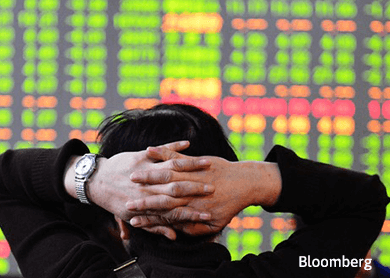
ONLY an excessively brave investor would bet that China’s increasingly desperate moves to prop up its stock market won’t work; only a fool would bet that they will.
The proper place for anyone with any choice in the matter is on the sidelines, watching with concern as China, faced with a rapid implosion in its stock market, attempts to overawe would-be sellers with a raft of powerful measures, all of them supportive of prices but injurious to the price-to-reality ratio.
With the Shanghai Composite Index having fallen close on 30% since June 12, Chinese authorities initiated a series of supporting measures, culminating with an announcement on Sunday that the central bank would provide unlimited, open-ended financing to a state-backed margin financing company for on-lending to those wishing to buy shares.
Some of this margin debt will flow to a group of 21 securities firms that have pledged 15% of their net assets, or US$19 billion (RM72.39 billion), to a stock market support fund. Initial public offerings have been suspended, apparently in hopes that investors who speculate on new issues will instead plow cash into existing ones.
These steps were only taken after China eased monetary policy and margin rules, both steps that failed to stem continued falls in equity indices.
Authorities, having tired, it seems, of the concept of markets as being about opposing forces, have also turned their ire on short-sellers, vowing investigation into “manipulation,” (see the irony there?) while also taking steps to both limit and make more expensive bets that stocks will go down.
China is clearly trying to position itself as a de-facto buyer of last resort of its own capital markets. While there is a fig leaf between the central bank and stock buying in that money is being on-lent for stock purchasing, much of the money is flowing to institutions that depend on official goodwill and can be counted on to fulfil official expectations.
While Shanghai shares did rally on the measures on Monday, rising 2.4%, stocks in Hong Kong, which is more insulated from official control, slid by 3.2%, their biggest fall since 2011. Chinese capital controls limit the ability of foreign investors to access Shanghai’s exchange.
“A failure by the People’s Bank of China would, however, be the first time that a major central bank has failed to make their ‘equity put’ effective,” hedge fund manager Stephen Jen of SLJ Macro Partners wrote in a note to clients, “and may mark the beginning of central banks experiencing diminishing returns on their policies.”
China is clearly committed to the idea of a “put,” an effective pledge to underwrite market prices, and is going far beyond the verbal interventions combined with the bond buying programmes initiated by the European Central Bank chief Mario Draghi and Ben Bernanke when he was chairman of the US Federal Reserve.
China’s commitment to the policy comes from a similar place: It wishes to use stock appreciation as a means to encourage the transition to a consumer-oriented economy from an export-centred one. A crash now threatens to undermine that transition and, importantly, the Chinese government’s prestige with its own people.
Still, a pledge of unlimited money for an unlimited time should, if it works, generate a bit more by way of gains than what we have seen.
While there have been a number of comparisons between China’s rescue and the unsuccessful effort in 1929 by Wall Street banks, notably JP Morgan, to support the stock market, China’s government-led rescue with no cap on cost is a different type of dish.
Perhaps the best historical parallel is the “Price Keeping Operation” done by Japan’s Ministry of Finance in 1992. Japan, concerned about the solvency of banks, large holders of equity which might be forced to mark stock holdings to market, initiated the operation, which ultimately included the use of public money for the direct purchase of stocks.
The thinking in Japan in 1992, as perhaps in China today, was that if only the government could push the Nikkei index up, private investors would follow as would an economic resurgence. While Japan’s stock market did recover somewhat on the official buying, it collapsed shortly after the programme was ended in 1994. What followed in Japan and its stock market is grim history.
“The ministry does not realise that by sending out signals that say ‘do not sell,’ it is giving signals that say ‘do not buy,’” former Nomura Chairman Yukio Aida was quoted as saying about Japan’s operation.
China is unarguably more powerful in its own domain than Japan was in 1992, and much more than Mario Draghi in 2012 or Ben Bernanke in 2008.
This makes the distortion of Chinese capital markets all the more toxic, and quite possibly, the ultimate price that much higher. — Reuters
This article first appeared in The Edge Financial Daily, on July 9, 2015.